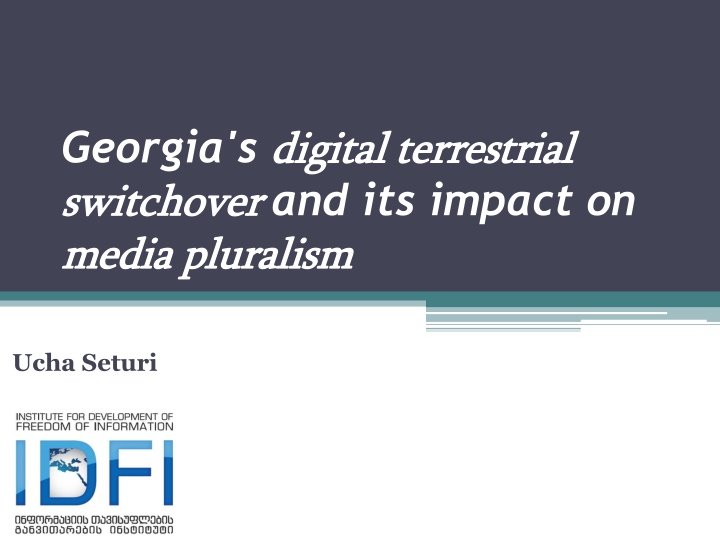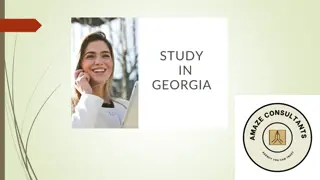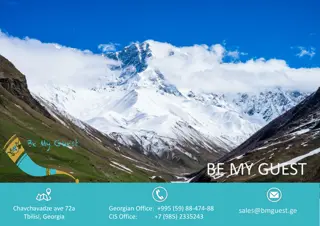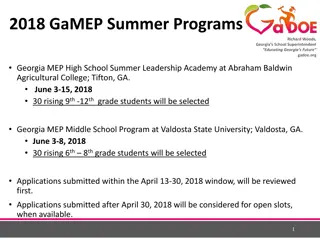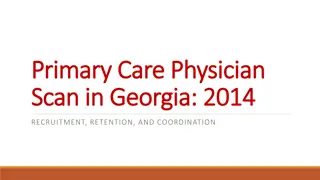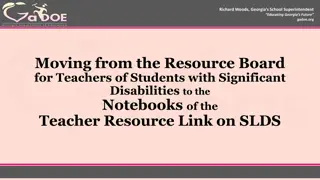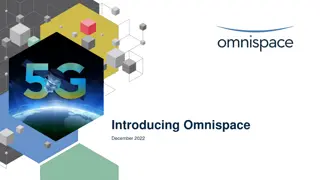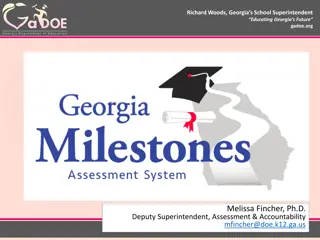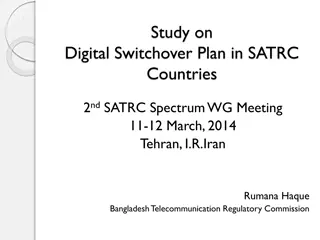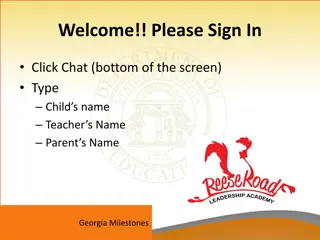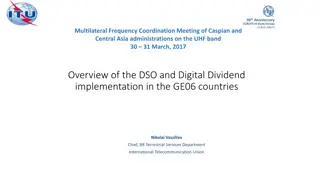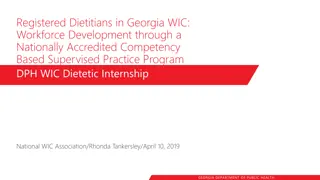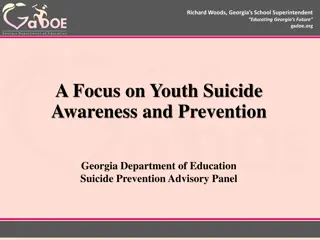Challenges and Opportunities of Georgia's Digital Terrestrial Switchover
The transition to digital terrestrial broadcasting in Georgia posed challenges such as lack of strategy and clear vision in 2012, but also highlighted opportunities like civil society involvement and donor support. Contrasting government and civil society models for digital infrastructure ownership further illustrate the complexities of the switchover process.
Download Presentation

Please find below an Image/Link to download the presentation.
The content on the website is provided AS IS for your information and personal use only. It may not be sold, licensed, or shared on other websites without obtaining consent from the author.If you encounter any issues during the download, it is possible that the publisher has removed the file from their server.
You are allowed to download the files provided on this website for personal or commercial use, subject to the condition that they are used lawfully. All files are the property of their respective owners.
The content on the website is provided AS IS for your information and personal use only. It may not be sold, licensed, or shared on other websites without obtaining consent from the author.
E N D
Presentation Transcript
Georgia's digital terrestrial digital terrestrial switchover switchover and its impact on media pluralism media pluralism Ucha Seturi
Stakeholders Government Ministry of Economic Development Digital Broadcasting Agency Georgian National Communications Commission Civil Society IDFI GARB OSGF Media Advocacy Coalition Donors
What we had in December 2012? No strategy, nor clear vision or goals, no action plan 2.5 years time period to digital switchover radio frequencies plan Small advertisement market Low incomes of the population Risks of political and commercial influence over the process of digitalization
How about good points for startup? Civil society was ready to play a role in digital transition "honeymoon" period with the new government Over 50% of the population was a consumer of terrestrial broadcasting Donors and International Organizations were ready to support digital switch over Lessons learned from positive or negative experience of other countries legal framework harmonized with EU regulations
Government model vs. civil society model Government model Civil Society model Private companies build, own and operate digital infrastructure No state investment in infrastructure Open and transparent tender to select MUX operators Free broadcasting licenses for small regional broadcasters Subsidies to socially vulnerable population to purchase set top boxes Digital infrastructure built, owned and operated by the state Estimated spending from the State Budget 80 M GEL No private investments in infrastructure Survival risk for small regional broadcasters Subsidies to socially vulnerable population to purchase set top boxes
Business Model ONLY PSB MUX WITH STATE FUNDING (4.5 M $) PRIVATE INVESTMENT (UP TO 10 M $) PRIVATE NATIONAL and LOCAL 22 MUXes 1 PRIVATE MUX OPERATORS 2 8900 GEL 8900 GEL(4000 $) PER ONE mgbit/s per month 22000 GEL (8000$) PER SD CHANNEL mgbit/s per month ACCESS FEES TRANSPARENCY (RO) ACCESS NONDISCRIMINATION COST ACCOUNTING 3 MUX OPERATOR DUTIES 4 Extra Internet access for Population Digital Dividend
Media Market after Digital Switch Over ANALOG DIGITAL 5 nationwide channels 27 Regional channels 15 nationwide channels 15 nationwide PAY-TV channels Up to 80-100 regional channels EXTRA 2 NATIONWIDE MUXes Up to 30 Nationwide channels Over 20 regional channels NO CAPACITY FOR NEW ENTRANCE
Overall Assessment of Digital Transition in Georgia Very slow process of digital switch over was intensified in 2014-15. Georgia started to switch off the analog signal in June, 2015 and ended the process in August, 2015. Regional broadcasters have already built 19 small MUXes all over the country. Access fee to digital infrastructure is reasonable and affordable. 450000 set top boxes are on the market, 220000 subsidized by the government for socially vulnerable population. Broadcasting license is no more needed. Broadcasters go through a simplified procedures of authorization instead. Existing infrastructure allows access for new TV channels, studios, content- providers More legal work to be done on specific regulations to secure broadcaster s access to MUX: financial, technical and legal conditions. Digital transition in Georgia is successful, secures media freedom, ensures media pluralism and creates opportunities for emerging content-producers
THANK YOU Is s it a heaven heaven for media outlets for media outlets? QUESTIONS? Ucha Seturi
